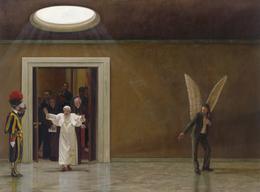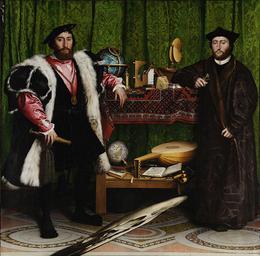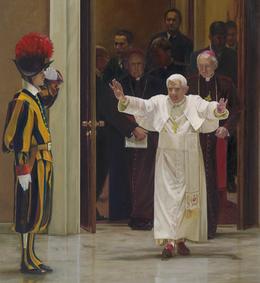The Triumph of the Subject over the Vatican
The psychoanalyst Fotini Ladaki offers a surprising reading of the painting »make/believe« that shows how Pope Benedict XVI. is ultimately a subject with autonomous agency

»If terror seems to be the basis for some of my productions, then I’d allege that this terror does not come from Germany, but from the within the soul.« (Edgar Allan Poe, Tales, 1840)
Leipzig in 2009, Kalaizis painted ‘make/believe’. It depicts Pope Benedict XVI who, with open arms as if in a welcoming gesture, seems to be hurrying towards a guest. Behind the Pope stand cardinals and other representatives of Catholic power. On his right is a member of the Swiss Guard; on his left an angel with large wings dressed in a lounge suit pointing to the floor
…is an angel in the shape of a male figure with enormous wings, dressed contemporarily. He is pointing to another, alternative path
The picture’s composition is reminiscent of ‘The Ambassadors’ painted in 1533 by Hans Holbein the Younger, in which rich merchants are depicted in their finery. Their clothes, jewellery and precious objects demonstrate the power of wealth and prosperity – all apart from a concealed object on the floor: a shield. Only from a certain angle can the skull on the shield be made out. This naked symbol from the many depictions of carcasses and ossuaries is a memento mori, a reminder of transience and death. Everything is transient – and a shroud has no pockets. However, this clear reference is not present in Aris Kalaizis’s painting. Instead, a completely different discourse appears to be floating above it, and also a different heaven: the heaven of the Vatican.

Did this painting epiphanically or telepathically foretell something destined to happen four years later?
Four years after the picture had been painted, Pope Benedict XVI resigned. True, a whole string of Popes had been forced to leave office due to infighting or power struggles at the Vatican, but only one had previously resigned in order to return to being a hermit: Celestine V. Benedict XVI visited Celestine’s tomb twice before announcing his decision.
…psychoanalysis and the Catholic church are incompatible
Resigning for such profane reasons as the infirmity of old age was unprecedented in papal history. There are many regions in Italy where all traces of Benedict XVI have been wiped out. Perhaps one day he will even be deleted from the list of Popes outright. After all, his decision certainly put the cat among the pigeons of the Vatican’s discourse and Catholic supremacy with its canonized phantasms. A Pope is only supposed to leave the Chair of Saint Peter by his natural or even sometimes unnatural demise (there have certainly been a few poisonings over the centuries), the decision lying solely with the Curia.
But Benedict XVI acted as only a psychoanalytical subject can, according to Lacan. Of course, the word ‘subjugation’ resonates in ‘subject’. And the subject of psychoanalysis is itself a subjugated subject – the difference being that the laws of the unconscious are quite different from those of the Vatican. The subject of psychoanalysis is a speaking subject (or, to use Lacan’s term, ‘parlêtre’).
Because the unconscious is constituted like language, we are only dealing with language. For this reason, psychoanalysis and the Catholic Church are irreconcilable. While psychoanalysis always speaks of God as the great other, as it also does with regard to religious education, the Church would have loved to forbid psychoanalysis altogether and excommunicated it.
Since the unconscious is constituted like a language, we are only concerned with language here. For this reason, psychoanalysis and the Catholic church are incompatible. While psychoanalysis is always talking about God as the Great Other and religious education, the church would have preferred to not only ban psychoanalysis but also excommunicate it long ago. Lacan claimed (not without cause) that the wealthy and the Catholics were impossible to analyse. So what did Benedict, the blessed or rhetorician, do? He acted. He clearly separated himself from his office and erected a barrier between it and his identity. Lacan claimed not only that the beggar was mad when he thought he was a king, but also that the king himself was mad when he thought he was a king. Slavoj Žižek hit the nail on the head:
the master-signifier … is by definition ‘empty’, and the ‘Master’ is the one who, by mere accident, occupies this empty space. For that reason, a Master is ultimately – that is, constitutively – an impostor: the constitutive illusion of the Master is that his being a Master results from his inherent charisma, not from his accidental occupation of a certain place in the structure.
This separation between the subject and the office is, however, not accidental. It is preceded by a true act – an act inscribed with a sense of urgency. According to Lacan, the subject performs a “passage à l’acte”. Such acts include suicide – actual or attempted. As Jacques Alain Miller put it
any true act in the Lacanian sense of the word is said to be a ‘suicide of the subject’, inverted commas indicating that the subject is reborn. This is what defines the act: the subject who comes after the act is not the same as the one before it. This justifies the use of the term ‘mutation’ … that any true act, any act which is not only arousal, emotion, motoric release, any true act, any act that leaves a mark, that counts, is an overcoming. … as seen from history, there is no true act which does not contain an overcoming: an overcoming of what? Of a code, a law, a symbolic whole.…
A little later, he adds another important point:
At the core of every act is a ‘no’ emerging in opposition of the other. And this actually justifies Lacan’s definition that the act always takes the place of speech. Basically, an act without a thereafter is in itself an act.
Benedict dared to act like a speaking subject. He assumed the status of the subject in psychoanalysis and thus spirited away the mysticism of the church and the laws of the council. According to Lacan, he thus took the place of the speaking subject.
In Aris Kalaizis’s mysterious painting, is Benedict XVI merely walking towards the visiting apparition of his own act? Is he ultimately triumphing over his own act? For, according to Jacques Alain Miller, the act is always a passage, because it has to do with the ‘passage à l’act’. Benedict has to find the real way out in order to achieve fulfilment. Does Kalaizis’s picture visualize the mysterious passage between the Swiss Guard – as the representative of a system of political surveillance – and the angel on the other side, the symbol of the heavenly order according to the Vatican? Is the artist employing iconographic visualization to show the passage which Benedict must take in order to perform the triumph of his own act?
that's what actually gives the act its relevancy – that the subject after is distinctly different from the one before
And there was light – again. And there was mankind. For mankind is defined by language and logos.
Benedict acted differently from Moses. He did not resign himself to the powers of the Vatican in order to give credence to the discourse on God by way of mysticism. Is art performing a telepathic act here? Freud did not consider telepathy part of psychoanalysis, since it does not come from the unconscious, and therefore not from within; it always comes from without. But is there also a within inside the without?
Art, too, has a morality, even though it may not always coincide with the morality of the church. Did Aris Kalaizis’s painting foreshadow this unusual event? Did Kalaizis perhaps slip into the role of Benedict XVI partly in order to demonstrate true sovereignty? Didn’t Velázquez achieve something similar in his picture ‘Las Meninas’? After all, he placed himself in the foreground as the true sovereign. According to Velázquez, the artist – not the king – is the true sovereign, for he creates from the creare ex nihilo, just as God once did. Is that why James Joyce once put the artist in place of God?
Did Benedict XVI commit hubris as defined by the Catholic church? Did his act call into question the mystical position of Vatican ethics? And in doing so, verify Lacan’s statement that there is no other than the Great Other?
We know what’s on earth and in heaven – neither contains God – and the question is what we make appear there in the disjunctions constituted by our techniques.
Benedict sinned as a desiring subject. But not according to Lacan, who maintained in his seminar ‘The Ethics of Psychoanalysis’: “The laws of heaven in question are the laws of desire.” And another proposition of Lacan’s is also valid in this context: his assertion that speaking subjects only betray themselves if they do not follow their desires.

Does Kalaizis’s picture visualize the mysterious passage between the Swiss Guard – as the representative of a system of political surveillance – and the angel on the other side, the symbol of the heavenly order according to the Vatican? Is the artist employing iconographic visualization to show the passage which Benedict must take in order to perform the triumph of his own act?
And there was light – again. And there was mankind. For mankind is defined by language and logos.
…Is art performing a telepathic act here? Freud did not consider telepathy part of psychoanalysis, since it does not come from the unconscious
Benedict acted differently from Moses. He did not resign himself to the powers of the Vatican in order to give credence to the discourse on God by way of mysticism. Is art performing a telepathic act here? Freud did not consider telepathy part of psychoanalysis, since it does not come from the unconscious, and therefore not from within; it always comes from without. But is there also a within inside the without?
Art, too, has a morality, even though it may not always coincide with the morality of the church. Did Aris Kalaizis’s painting foreshadow this unusual event? Did Kalaizis perhaps slip into the role of Benedict XVI partly in order to demonstrate true sovereignty? Didn’t Velázquez achieve something similar in his picture ‘Las Meninas’? After all, he placed himself in the foreground as the true sovereign. According to Velázquez, the artist – not the king – is the true sovereign, for he creates from the creare ex nihilo, just as God once did. Is that why James Joyce once put the artist in place of God?
Did Benedict XVI commit hubris as defined by the Catholic church? Did his act call into question the mystical position of Vatican ethics? And in doing so, verify Lacan’s statement that there is no other than the Great Other?
We know what’s on earth and in heaven – neither contains God – and the question is what we make appear there in the disjunctions constituted by our techniques.
Benedict sinned as a desiring subject. But not according to Lacan, who maintained in his seminar ‘The Ethics of Psychoanalysis’: “The laws of heaven in question are the laws of desire.” And another proposition of Lacan’s is also valid in this context: his assertion that speaking subjects only betray themselves if they do not follow their desires.
References:
J. Lacan: The Triumph of Religion, Polity Press, Cambridge/Malden, MA, 2013, p.36
Jacques Lacan: The Ethics of Psychoanalysis, Seminar VII, Quadriga, 1996, p. 325
Jacques-Alain Miller: „Von einem anderen Lacan“, Turia und Kant, 1994, pp. 102 – 105
Slavoj Zizek (ed.): Everything You Always Wanted to Know About Lacan (But Were Afraid to Ask Hitchcock), Verso, London/New York, 1992, p. 236

Fotini Ladaki was born in northern Greece in 1952. A psychoanalyst after Lacan and Freud, she works in her own practice in Cologne. She is also a freelance writer. In addition to several essays on art and psychoanalysis, plays, stories and poetry, she has also written ‘Moritz’ by Gerhard Richter. About the horror of seeing the experience of being. Her other publications can be found on www.praxisfls.de.
©2017 Fotini Ladaki | Anna Popoulias | Aris Kalaizis